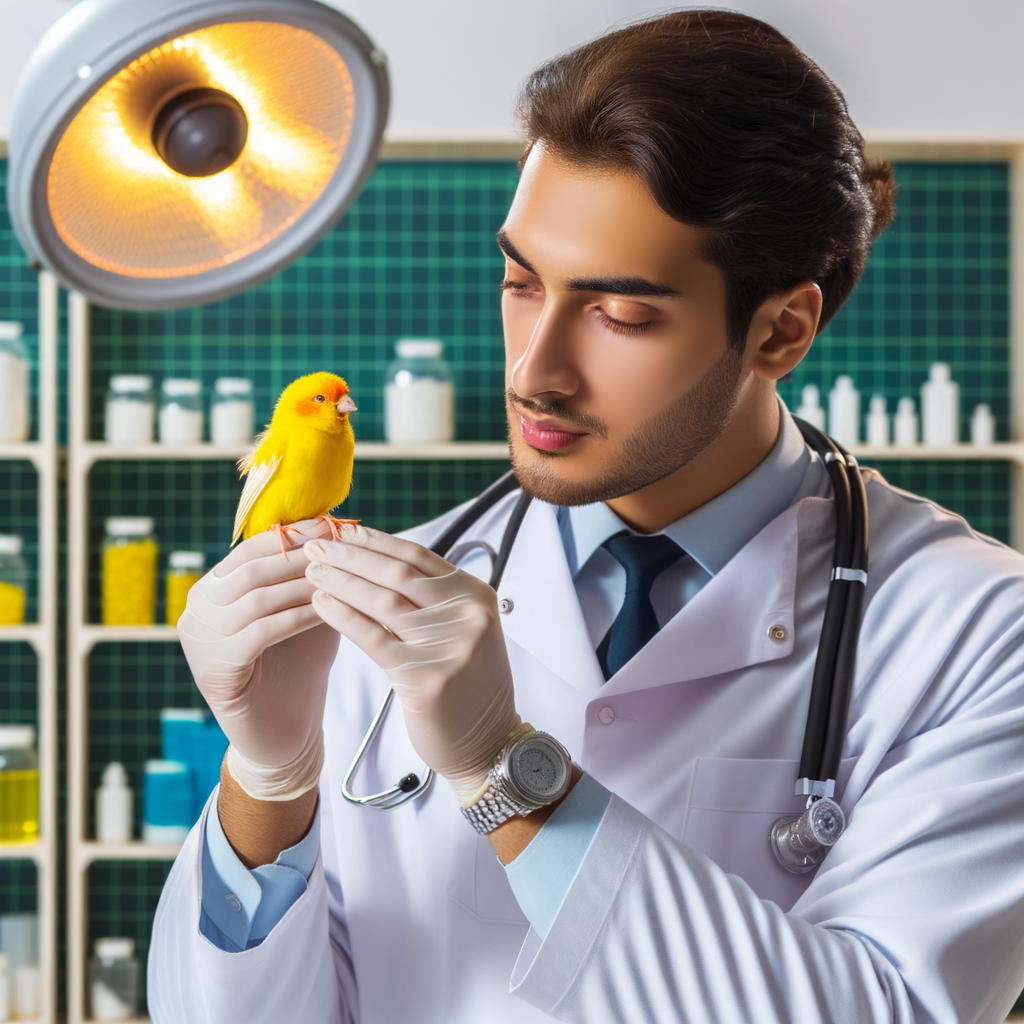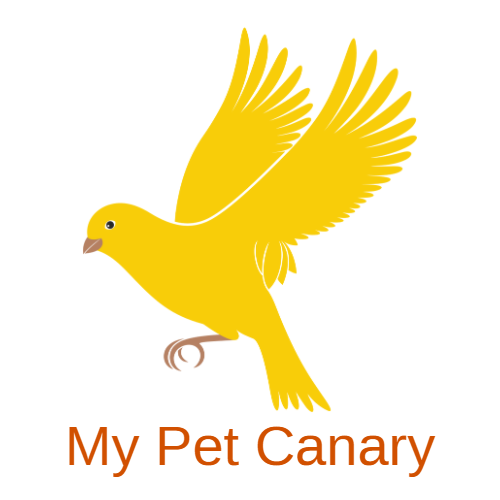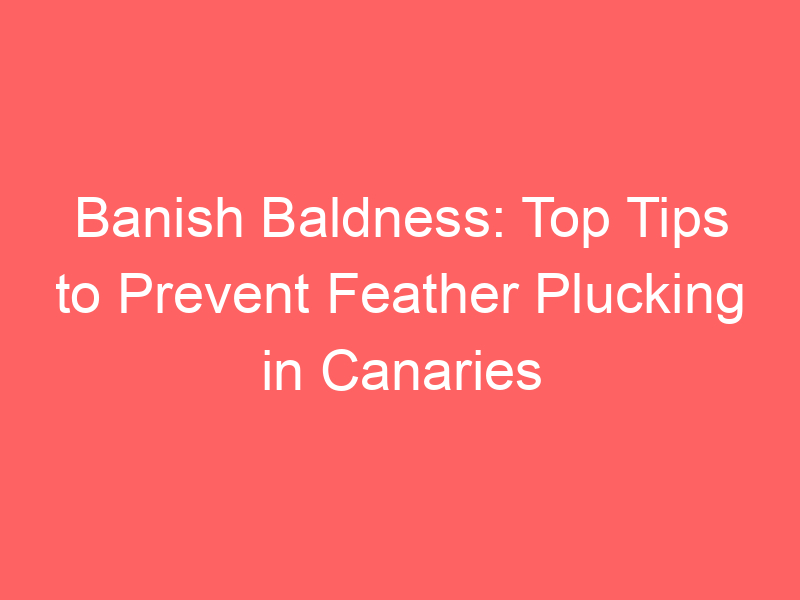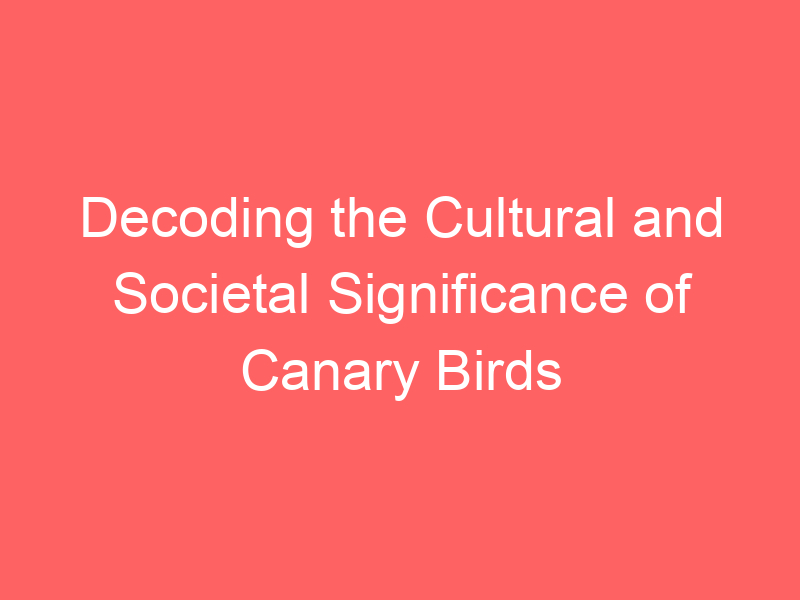
Introduction to Canary Bird Care
Welcome to our comprehensive guide on canary bird care. As a canary owner, it’s important to understand the basics of caring for these vibrant, cheerful birds and the importance of maintaining their healthy plumage. Let’s dive in!
-
Understanding the Basics of Canary Bird Care
Canaries are known for their vibrant colors and melodious songs. But, to keep them happy and healthy, there are certain basics you need to understand. Canaries need a balanced diet, a clean and spacious cage, and plenty of exercise and social interaction.
They thrive on a diet of seeds, fruits, and vegetables, with the occasional treat of boiled eggs or mealworms. The cage should be large enough for them to fly around and should be cleaned regularly to prevent diseases. Canaries are social birds, so they need plenty of interaction with their owners or other birds.
It’s also important to monitor their health regularly. Any changes in their behavior, appetite, or appearance could be a sign of illness and should be checked by a vet.
-
Importance of Maintaining Healthy Plumage in Birds
A canary’s plumage, or feathers, is not just for show. It plays a crucial role in their overall health and well-being. Healthy feathers provide insulation, help with flight, and are a sign of good health.
Feather plucking or loss could be a sign of stress, boredom, or health issues. It’s important to provide your canary with a balanced diet, plenty of exercise, and mental stimulation to prevent feather plucking. Regular grooming, including baths and nail trims, can also help maintain healthy plumage.
Remember, a healthy canary is a happy canary. By understanding the basics of canary care and the importance of maintaining healthy plumage, you can ensure your feathered friend lives a long, happy life.
Understanding Feather Plucking in Canaries
Feather plucking in canaries is a serious concern for bird owners. It’s important to understand what it is, why it happens, and how to prevent it. Let’s delve into the topic.
What is Feather Plucking?
Feather plucking, also known as feather picking or over-preening, is a behavior where birds pull out their own feathers, leading to bald spots or even skin damage. It’s not a natural behavior and often indicates a problem that needs attention.
- Definition of Feather Plucking: Feather plucking is a compulsive behavior in birds where they excessively preen or pull out their own feathers. It’s not part of the normal grooming process and can lead to severe health issues if not addressed promptly.
- Common Signs of Feather Plucking in Canaries: If your canary is plucking its feathers, you may notice bald patches on its body, especially around the chest and back. The bird may seem restless or agitated and spend a lot of time preening. You might also find an unusual amount of feathers in the cage.
Feather plucking is a complex issue with many potential causes. It’s crucial to observe your canary’s behavior closely and consult a vet if you notice any signs of feather plucking. In the next section, we will discuss the common causes of this behavior.
Causes of Feather Plucking
Feather plucking in canaries can be a result of various factors. These factors can be broadly categorized into environmental, health-related, and psychological stress-related. Let’s delve deeper into each of these causes:
- Environmental Factors
- Health Issues
- Psychological Stress
Canaries are sensitive creatures and their environment plays a crucial role in their overall health and behavior. An environment that is too hot, too cold, or has inconsistent temperatures can lead to discomfort and stress, which can trigger feather plucking. Similarly, a cage that is too small or overcrowded can also cause this behavior. It’s important to provide your canary with a comfortable and spacious environment to prevent feather plucking.
Health issues are another major cause of feather plucking in canaries. Parasites, skin infections, and nutritional deficiencies can all lead to feather plucking. It’s essential to regularly monitor your canary’s health and provide them with a balanced diet to prevent these issues. Regular vet check-ups can also help in early detection and treatment of health problems.
Just like humans, canaries can also suffer from psychological stress. This can be due to changes in their environment, loneliness, or boredom. Canaries are social birds and they need interaction and mental stimulation. Lack of these can lead to stress and result in feather plicking. Providing toys, interaction, and mental stimulation can help in reducing stress and preventing feather plucking.
In conclusion, understanding the causes of feather plucking can help in preventing this behavior and ensuring the health and happiness of your canary. Remember, a happy canary is a healthy canary!
Preventing Feather Plucking in Canaries
Feather plucking in canaries can be a sign of stress, poor health, or an uncomfortable environment. It’s essential to take proactive steps to prevent this behavior to maintain your bird’s health and happiness. Here are some tips on how to care for your canary’s feathers and prevent feather plucking.
Canary Bird Feather Care Tips
Proper care of your canary’s feathers involves providing a balanced diet, ensuring a comfortable environment, and scheduling regular health check-ups. Let’s delve into these points:
- Providing a Balanced Diet
- Ensuring a Comfortable Environment
- Regular Health Check-ups
A balanced diet is crucial for your canary’s overall health and feather condition. Include a variety of seeds, fruits, and vegetables in their diet. Foods rich in vitamins A and E, such as carrots and spinach, can help improve feather health. Remember, a healthy bird is less likely to engage in feather plucking.
A comfortable environment can significantly reduce stress, a common cause of feather plucking. Ensure your canary’s cage is spacious, clean, and located in a quiet, well-lit area. Avoid sudden temperature changes and keep the cage away from drafts. Also, provide perches of different sizes for foot exercise.
Regular health check-ups with a vet can help detect any health issues early. If your bird is plucking its feathers, it could be a sign of a health problem. A vet can provide treatment and advice to prevent further feather plucking.
In conclusion, preventing feather plucking in canaries requires a holistic approach that includes proper nutrition, a comfortable living environment, and regular health check-ups. By following these tips, you can help ensure your canary stays happy and healthy with a beautiful plumage.
Feather Plucking Solutions
Feather plucking in canaries can be a distressing sight for any bird owner. However, there are several effective solutions to this problem. Here are three key strategies to prevent feather plucking in your canary:
- Introducing Toys and Enrichment Activities
- Using Feather Plucking Deterrents
- Consulting a Vet for Professional Help
Canaries are active and intelligent birds that require mental stimulation to stay healthy. Lack of engagement can lead to boredom and stress, which may result in feather plucking. Introducing toys and enrichment activities into your canary’s environment can provide the necessary stimulation and reduce feather plucking.
Simple toys such as mirrors, bells, and ladders can keep your canary entertained. Additionally, providing foraging opportunities with food puzzles can mimic their natural behavior in the wild, promoting mental health and reducing the likelihood of feather plucking.
There are several products available in the market designed to deter feather plucking in birds. These include deterrent sprays and creams that can be applied to the bird’s feathers. They work by creating an unpleasant taste or sensation when the bird attempts to pluck its feathers, discouraging the behavior.
While these products can be effective, they should be used as a last resort and always under the guidance of a vet. It’s important to remember that feather plucking is often a symptom of an underlying issue, so addressing the root cause is crucial.
If your canary continues to pluck its feathers despite your best efforts, it’s time to seek professional help. A vet can conduct a thorough examination to identify any potential health issues that might be causing the feather plucking.
They may recommend changes to your bird’s diet, environment, or daily routine. In some cases, medication or behavioral therapy may be necessary. Remember, each bird is unique, so what works for one may not work for another. A vet can provide personalized advice based on your canary’s specific needs.
In conclusion, feather plucking in canaries can be prevented through a combination of mental stimulation, deterrents, and professional help. By understanding and addressing the needs of your canary, you can ensure a healthy, happy life for your feathered friend.
Maintaining Healthy Plumage in Canaries
Keeping your canary’s feathers in top-notch condition is a vital part of bird care. This section will guide you through the steps to foster healthy feathers in canaries.
Fostering Healthy Feathers in Canaries
There are three key elements to maintaining healthy plumage: regular grooming, bathing, and proper nutrition. Let’s delve into each of these aspects.
- Regular Grooming
- Importance of Bathing
- Proper Nutrition for Healthy Feathers
Regular grooming is essential for your canary. It helps keep their feathers clean and free from parasites. A soft brush or a bird grooming glove can be used to gently stroke your canary, removing loose feathers and dust.
Bathing is not just about cleanliness; it also plays a significant role in feather health. A good bath helps hydrate the feathers, keeping them flexible and strong. Ensure your canary has access to a bird bath or a shallow dish of water every day.
Feathers are made of protein, so a diet rich in high-quality proteins is crucial for feather health. Foods like eggs, peas, and quinoa are excellent protein sources. Additionally, vitamins A, B, and E, found in fruits and vegetables, are essential for feather growth and strength.
In conclusion, maintaining healthy plumage in canaries requires regular grooming, frequent baths, and a balanced diet. By following these steps, you can ensure your canary’s feathers stay vibrant and healthy.
Canary Bird Health: Beyond the Feathers
While the vibrant plumage of canaries is a sight to behold, their health extends beyond just their feathers. Understanding their behavior, recognizing common health issues, and ensuring regular vet check-ups are all integral to maintaining a healthy canary.
- Understanding Canary Bird Behavior
- Common Health Issues in Canaries
- Importance of Regular Vet Check-ups
Canaries are known for their lively and energetic nature. Observing their behavior can give you insights into their health. A healthy canary is active, has a good appetite, and sings often. Changes in these behaviors can be a sign of illness or stress. For instance, a canary that is fluffed up, quiet, or less active than usual may be unwell.
Despite their robust nature, canaries can be prone to certain health issues. Some of the common ones include feather plucking, respiratory problems, and mites. Feather plucking can be a sign of stress, poor nutrition, or a skin condition. Respiratory problems can be indicated by wheezing, coughing, or difficulty breathing. Mites can cause itching, feather loss, and discomfort.
| Health Issue | Signs |
|---|---|
| Feather Plucking | Loss of feathers, visible discomfort |
| Respiratory Problems | Wheezing, coughing, difficulty breathing |
| Mites | Itching, feather loss |
Regular vet check-ups are crucial for early detection and treatment of health issues in canaries. A vet can perform a thorough physical examination, assess the bird’s overall health, and provide necessary treatments or preventive care. Regular check-ups can help ensure your canary stays healthy and happy.
In conclusion, canary bird health is a multifaceted issue that goes beyond their beautiful feathers. By understanding their behavior, being aware of common health issues, and ensuring regular vet check-ups, you can contribute significantly to your canary’s well-being.
Case Studies: Preventing Bird Feather Plicking
Let’s take a look at two real-life examples of how feather plucking in canaries was successfully prevented. These case studies will provide valuable insights into the practical application of the prevention methods we’ve discussed.
-
Case Study 1: Successful Prevention of Feather Plucking
Meet Sunny, a cheerful canary who had developed a feather plucking habit. Sunny’s owner, Mrs. Johnson, noticed the issue early and took immediate action. She started by improving Sunny’s diet, introducing a variety of fresh fruits and vegetables along with the regular seed mix. She also provided plenty of toys and a larger cage to keep Sunny entertained and active.
Additionally, Mrs. Johnson made sure Sunny had regular exposure to natural sunlight, which is essential for a bird’s overall health and well-being. Within a few weeks, Sunny’s feather plucking habit reduced significantly, and he started to grow back his beautiful, vibrant feathers. This case demonstrates that early intervention and simple changes in care can successfully prevent feather plucking in canaries.
-
Case Study 2: Overcoming Feather Plucking with Professional Help
Our second case study involves a canary named Peep. Unlike Sunny, Peep’s feather plucking habit was quite severe and had persisted for several months. Peep’s owner, Mr. Smith, had tried various methods to prevent the feather plucking, but nothing seemed to work. Finally, he decided to seek professional help.
Mr. Smith consulted an avian veterinarian who conducted a thorough examination of Peep. The vet discovered that Peep was suffering from a skin infection, which was causing him discomfort and leading to the feather plucking. With the right medication and a few changes in his care routine, Peep was able to overcome his feather plucking habit. This case study highlights the importance of seeking professional help when dealing with persistent feather plucking.
Both these case studies show that with the right approach and timely intervention, feather plucking in canaries can be prevented. Whether it’s through improving the bird’s diet and environment or seeking professional help, the key is to identify the problem early and take appropriate action.
Conclusion: The Importance of Preventing Feather Plucking in Canaries
As we conclude, it’s essential to understand the significance of preventing feather plucking in canaries. This behavior is not only detrimental to the bird’s physical health but also indicates underlying issues that need immediate attention. Let’s summarize the key takeaways and share some final thoughts on canary bird feather care.
- Summary of Key Takeaways
- Final Thoughts on Canary Bird Feather Care
Throughout this article, we’ve learned that feather plucking in canaries is often a sign of stress, poor diet, or lack of stimulation. We’ve also discovered that prevention is always better than cure. By providing a balanced diet, enriching environment, and regular vet check-ups, we can ensure our canaries maintain their beautiful plumage and overall health.
Canary bird feather care is more than just about aesthetics. It’s about ensuring the well-being of these delicate creatures. Feather plucking is a serious issue that requires immediate attention. By understanding its causes and implementing preventive measures, we can help our canaries lead a healthy and happy life.
In the words of renowned bird expert, Dr. Irene Pepperberg, “Feathers are not just a covering for the bird; they are a reflection of its health and happiness.” Let’s strive to keep our canaries’ feathers vibrant and their spirits high.
| Key Factors in Preventing Feather Plucking | Recommended Actions |
|---|---|
| Proper Diet | Provide a balanced diet rich in vitamins and minerals. |
| Enriching Environment | Ensure the bird’s cage is clean, spacious, and filled with toys. |
| Regular Vet Check-ups | Schedule regular vet visits to monitor the bird’s health. |
Remember, a happy canary is a healthy canary. Let’s do our part in ensuring their happiness and health by preventing feather plucking.







